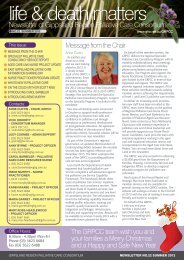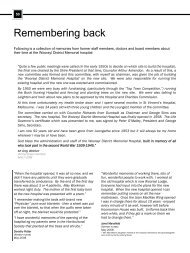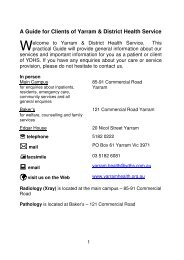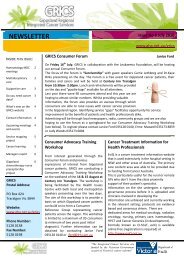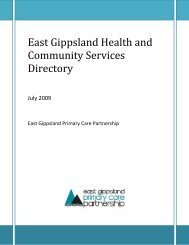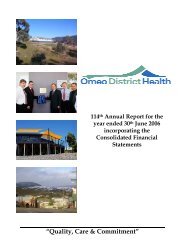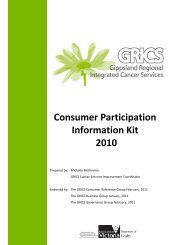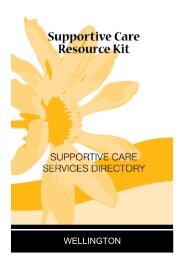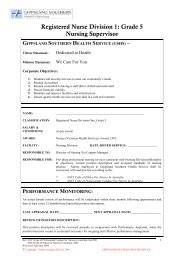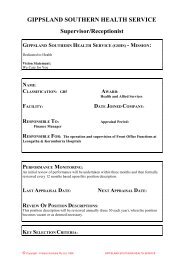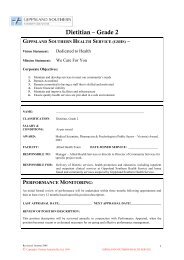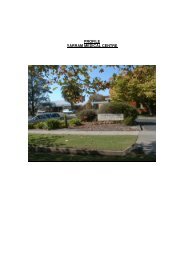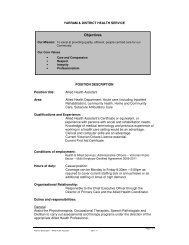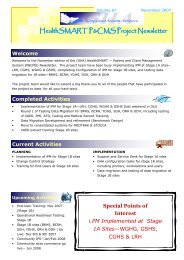Building for a brighter future - GHA Central
Building for a brighter future - GHA Central
Building for a brighter future - GHA Central
Create successful ePaper yourself
Turn your PDF publications into a flip-book with our unique Google optimized e-Paper software.
Review of Operations: Quality Report<br />
In response to learning from<br />
others in healthcare across<br />
Australia, WGHG has:<br />
➤ Reviewed blood transfusion<br />
practices in line with best practice<br />
models<br />
➤ Introduced best practice use of<br />
pain relievers in the Emergency<br />
department<br />
➤ Implemented the Surgical<br />
Consultative Council five step<br />
patient identification processes to<br />
help ensure we have the correct<br />
patient <strong>for</strong> the correct procedure<br />
A heightened awareness<br />
of procedures and<br />
encouragement to report,<br />
has resulted in staff<br />
reporting more errors in<br />
medication documents.<br />
This positive increase<br />
indicates errors are being<br />
picked up be<strong>for</strong>e the<br />
medications are given,<br />
preventing potential harm.<br />
Medication management<br />
In 2004-05, after a review of the most<br />
common <strong>for</strong>ms of medication error,<br />
we concentrated on how medications<br />
could be unintentionally omitted.<br />
Improvement strategies implemented<br />
dramatically improved the number<br />
of errors relating to the omission of<br />
medications by 66%.<br />
In 2005-06 the focus was on<br />
errors relating to documentation.<br />
Medication incidents are regularly<br />
discussed at Nursing Council meetings<br />
and in the Medication Safety Working<br />
Party so that improvement strategies<br />
can be targeted in the most effective<br />
manner.<br />
This year:<br />
➤ Clinical Nurse Managers changed<br />
handover processes to include<br />
checking of medications at the<br />
bedside <strong>for</strong> all Ward areas<br />
➤ The medication management<br />
procedure was reviewed<br />
➤ All nursing staff received in-service<br />
training on medication management<br />
procedures and general incident<br />
reporting<br />
➤ In a “no-blame” culture, staff were<br />
actively encouraged to report all<br />
documentation errors detected.<br />
The data <strong>for</strong> 2005-06 now shows<br />
a 129% increase in the number<br />
of incidents reported (31 to 71).<br />
Of the 71 reported incidents in<br />
this category, only one had a minor<br />
outcome requiring medical review<br />
<strong>for</strong> the patient.<br />
Another project aimed at reducing<br />
medication errors by targeting the<br />
way medications are documented,<br />
commenced in 2004-05 when<br />
WGHG trialled a standardised<br />
national medication chart and<br />
provided feedback to the National<br />
Quality And Safety Council, National<br />
Medication Chart pilot project. This<br />
year the National Medication Chart<br />
was fully implemented at WGHG.<br />
Pharmacist Kenneth Ch’ng ensures<br />
the medications prescribed on the<br />
medication chart are the correct medication<br />
prior to discharge of patient Arthur Row.<br />
Falls<br />
Falls remain one of the top two<br />
incidents reported at WGHG.<br />
Falls projects, commenced last year,<br />
continue with best practice falls risk<br />
assessments and minimisation<br />
strategies being implemented in<br />
all clinical areas and extending into<br />
the community. As part of this, a new<br />
Admission and Discharge <strong>for</strong>m that<br />
includes an initial falls screening tool<br />
was trialled and implemented. If the<br />
initial screen confirms a risk of falling<br />
a second more extensive tool is<br />
completed and falls reduction<br />
strategies implemented in the care<br />
planning.<br />
Analysis of the data shows we are<br />
making a difference. This year there<br />
has been a 17% decrease in the<br />
number of falls occurring in hospital<br />
resulting in minor injuries in the acute<br />
Types of Medication Errors Reported<br />
80<br />
70<br />
60<br />
50<br />
40<br />
30<br />
20<br />
10<br />
0<br />
2003/04<br />
2004/05<br />
2005/06<br />
Omitted dose<br />
Documentation related<br />
Wrong dose<br />
Not detailed<br />
Wrong drug<br />
Duplicated dose<br />
Wrong rate<br />
IV therapy and Site issues<br />
Delayed dose<br />
Wrong patient<br />
Known allergy<br />
Wrong route<br />
Self administering<br />
Adverse drug reaction<br />
Drug intervention<br />
Incompatible blood product<br />
Overall the number of errors reported <strong>for</strong> 2005-2006, in nearly all categories, has increased. Staff have been provided with a series of incident<br />
reporting sessions to encourage reporting. This has improved the climate of reporting and has given us more opportunities to learn.<br />
23



